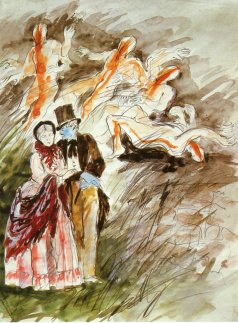'What is it?'
Illustration based on the novel 'Poor Miss Finch' by Wilkie Collins, 1872 (In private ownership)
Many writers of fiction and poetry have used epilepsy as a theme in their books, e.g. Isabel Allende, Agatha Christie, F.M. Dostoyevsky (who had epilepsy himself), Siegfried Lenz, Thomas Mann, Elsa Morante, Christoph Ransmayr, Christa Wolf [see also the Epilepsy Museum's literature list].
In 'Poor Miss Finch' by Wilkie Collins (1824-1899), one of the main characters, the young man Oscar, has epilepsy, and his illness plays a major role in the novel. Oscar, who is engaged to the blind Lucilla, got epilepsy as the result of a head injury received in an accident.
Oscar's first seizure, which the first-person narrator of the novel experiences herself, is described thus:
As the words passed his lips, a frightful contortion fastened itself on Oscar's face. His eyes turned up hideously. From head to foot his whole body was wrenched round, as if giant hands had twisted it, towards the right. Before I could speak, he was in convulsions on the floor at his doctor's feet.
'Good God, what is this!' I cried out. The doctor loosened his cravat, and moved away the furniture that was near him. That done, he waited - looking at the writhing figure on the floor.
'Can you do nothing more?' I asked.
He shook his head gravely. 'Nothing more.'
'What is it?'
'An epileptic fit.'

Following the medical treatment of the time, Oscar's epilepsy is treated with silver nitrate, a drug which has the unpleasant side effect of giving the skin a bluish tint. For Oscar's fiancée Lucilla, this is not an aesthetic problem as she is blind, but it threatens to become one when a German eye specialist offers to operate on Lucilla and restore her eyesight...
There are some privately owned prints illustrating the exciting and amusing stories written in the genres of the English Gothic and social novel of the last century. There are some privately owned prints illustrating the exciting and amusing stories written in the genres of the English Gothic and social novel of the last century.
This picture shows the engaged couple - the blind Lucilla and her bluish-looking fiancé. In the background, the different phases of one of Oscar's grand mal seizures are depicted. The artist has sketched the body axis in orange. This signal colour sets off the drama of the fall during the convulsion, which is portrayed in different stages (from the body standing up straight to it lying on the ground).
--- close this window ---